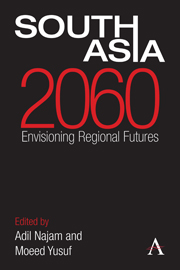Book contents
- Frontmatter
- Contents
- Acknowledgments
- List of Abbreviations
- Introduction: Imagining South Asian Futures
- Section I South Asia as a Region
- Section II State Relations
- Section III Development
- Section IV Human Well-Being
- Chapter 27 Population Dynamics, Economic Prospects and Regional Coherence
- Chapter 28 Towards Cooperation for Poverty Reduction?
- Chapter 29 Health Challenges
- Chapter 30 Regional Disease Dynamics
- Chapter 31 Education: Time Bomb or Silver Bullet?
- Chapter 32 Scholarship in and on South Asia
- Chapter 33 Rights and Justice: A Prospective View
- Chapter 34 Patriarchy, Power and Paradox: Dreaming Gender Equality and Development
- Chapter 35 Women in South Asia
- Chapter 36 Media: New Trends, Old Problems
- Chapter 37 Sports: Passion and Industry
- About the Authors
- Bibliography
- Index
Chapter 34 - Patriarchy, Power and Paradox: Dreaming Gender Equality and Development
from Section IV - Human Well-Being
Published online by Cambridge University Press: 05 September 2013
- Frontmatter
- Contents
- Acknowledgments
- List of Abbreviations
- Introduction: Imagining South Asian Futures
- Section I South Asia as a Region
- Section II State Relations
- Section III Development
- Section IV Human Well-Being
- Chapter 27 Population Dynamics, Economic Prospects and Regional Coherence
- Chapter 28 Towards Cooperation for Poverty Reduction?
- Chapter 29 Health Challenges
- Chapter 30 Regional Disease Dynamics
- Chapter 31 Education: Time Bomb or Silver Bullet?
- Chapter 32 Scholarship in and on South Asia
- Chapter 33 Rights and Justice: A Prospective View
- Chapter 34 Patriarchy, Power and Paradox: Dreaming Gender Equality and Development
- Chapter 35 Women in South Asia
- Chapter 36 Media: New Trends, Old Problems
- Chapter 37 Sports: Passion and Industry
- About the Authors
- Bibliography
- Index
Summary
“Just open the door and let the women out!”
Shahla Farid, Kabul University, 2006“Can't you see, can't you see,” said a Bengali village woman in 2003 when asked by Brenda McSweeney if an initiative for creative manual skills for self-reliant development made a difference in the community. “Everything has changed for us! Before, I myself and many other women never left our courtyards. Now, we are here together and our men are listening to us. Can't you see?”
Responding to the formulaic and age-old patriarchal justification for the unsuitability of women for manly professions due to their “nature,” Shahla Farid, a law professor at Kabul University, Afghanistan, in a conversation with Shahla Haeri pointedly expressed the desire and desirability for mobility, and the unimpeded freedom of movement for women. Further implied in her statement, and in the story of the Bengali village women, is the multiplicity of meanings that are embedded in these poignant yet distressing narratives: it is not women's “nature” that has kept them underdeveloped, but rather the weight of political and cultural dominance and religious discrimination. Unless women are seen as “fully human” and heard by men in power, little will change. Women's energies and talents are wasted unless invested for the development of themselves, their families and societies. If given a chance, women can achieve excellence.
- Type
- Chapter
- Information
- South Asia 2060Envisioning Regional Futures, pp. 270 - 276Publisher: Anthem PressPrint publication year: 2013



